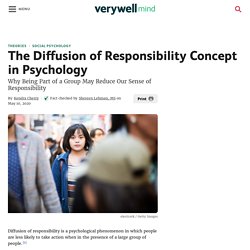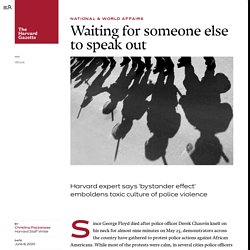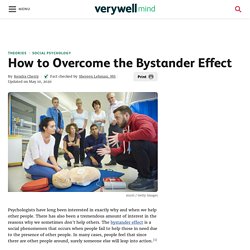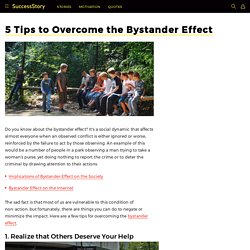

Bystander Effect. What Is the Bystander Effect?
This video explains the Bystander Effect, the diffusion of responsibility where people believe someone else will step in to help instead. Also, worrying that their help will not be needed as there will be more qualified individuals around to help instead. People tend to focus on each other rather than the surroundings due to the social norms on focusing on the people we are with. But when individuals are alone and they see someone in help, they will first scan other people nearby to see if anyone else is reacting, and if they are not, they will believe that it is a non-emergency situation and therefore, will less likely step up to help. Lastly, individuals with medical and self-defense training alongside empathy, knowing the victim personally as well as thinking that the victim deserves help will increase their obligations to intervene. – yqichan001
Is the Bystander Effect Real? Indifference Kills: Bystander Apathy. How Diffusion of Responsibility Affects Group Behavior. Diffusion of responsibility is a psychological phenomenon in which people are less likely to take action when in the presence of a large group of people.1 For example, imagine that you are in a large city on a bustling street.

You notice a man fall to the ground and start convulsing as if having a seizure. Many people turn and look at the man, but no one moves to help or call for medical assistance. Why? Because there are so many people present, no one person feels pressured to respond. Understanding Pluralistic Ignorance in Social Psychology - Psychologenie. Does the appearance of the distressed play a part? Example: George Floyd's Death - Police violence and the ‘bystander effect’ explained. Since George Floyd died after police officer Derek Chauvin knelt on his neck for almost nine minutes on May 25, demonstrators across the country have gathered to protest police actions against African Americans.
This article goes into detail on how the Bystander Effect costs George Floyd's life. – yqichan001
While most of the protests were calm, in several cities police officers have used force against demonstrators and journalists under the justification of crowd control.

The sight of officers in riot gear beating marchers, firing rubber bullets and chemical- or pepper-based irritants, and shoving activists has reignited questions about accepted practices in the nation’s law enforcement community. Francesca Gino, Tandon Family Professor of Business Administration at Harvard Business School, studies leadership, the psychology of decision-making, and organizational behavior. She has written about how an organization can develop a culture that can turn harmful to its own people, to the success of its mission, and to its own reputation. This is not a story in isolation. The Shocking Murder of Ilan Halimi. In 2006 a young Parisian Jew was kidnapped and brutally murdered because he was Jewish.
This article explained to us how Ilan Halimi got tortured and murdered in an apartment building, surrounded by neighbors who could hear the commotion coming for 24 days, but did nothing to intervene. Eventually, he died due to unsustainable injuries. – yqichan001
French authorities initially refused to believe it was a hate crime.

This article originally appeared in Ami Magazine. Little did Ilan Halimi know that day that the customer walking into the cellphone store where he worked as a salesman would be the agent of his death. The young woman looked around at the merchandise, asked questions and engaged him in friendly conversation. They hit it off so well that before leaving, she asked Ilan for his phone number. The next evening Ilan received a call from his new acquaintance, inviting him out for a drink.
His mother, Ruth Halimi, agreed to meet me in the recently-dubbed Ilan Halimi Gardens, a pocket-sized oasis of green on a busy street in the 12th arrondissement. A small woman, she has dark eyes set in a determined, pale face. “I’m a woman who naturally shies away from crowds and doesn’t like being in limelight. I ask her to tell me about her son. January 21.
Online Bullying and the Bystander Effect. Melania Trump will become First Lady of the United State in January.
The Bystander Effect also applies in the digital world, where victims fall under cyber-bullying. Cyber-bullying has often been not taken seriously and overlooked as a crime. This has resulted in many victims committing suicide as an escape. It is easy to become a bystander online. The online community is huge, personal relationships are rarely formed, our level of obligation to intervene drops. We, however, failed to realize that being an active bystander in the digital world is easier than we think. It can often be as easy as reporting an abusive user to the platform's authority or reaching out to the victim. – yqichan001
She recently said that as First Lady she will dedicate herself to fighting online bullying.

“Technology has changed our universe,” she said. Yue Yue dead: Chinese girl Wang Yue, 2, run over as bystanders watch, dies. Yue Yue, the girl who shamed China, is dead: Two-year-old run over TWICE as dozens of people ignored her lying in the road succumbs to her injuries Announcement of her death quickly became the most talked about topic on China's version of TwitterLawmakers set to meet to discuss introduction of 'Good Samaritan' legislationCountry's economic boom and disparity between rich and poor have made changing social values a contentious topic By Richard Hartley-parkinson Updated: 09:25 EDT, 5 November 2011 The Chinese girl left bleeding in a road after being run over by two different vehicles and then ignored by 18 passersby has finally died.

The smoke filled room study. THE BYSTANDER EFFECT. Bystander Apathy Experiment - The Case of Kitty Genovese Explained. Fear of Negative Evaluation Affects helping Behavior The Bystander Effect Revisited. Measuring Helping Behavior Across Cultures. How to Overcome the Bystander Effect. Psychologists have long been interested in exactly why and when we help other people.
This article teaches us ways to overcome the Bystander Effect, here are some of the few examples listed: 1. Be influenced by others’ helping behaviour 2. Be observant of our surroundings 3. Take up some medical/self defence skills, etc 4. Think about the guilt if we do not help – yqichan001

5 Effective Tips to Overcome the Bystander Effect. Do you know about the bystander effect?

It's a social dynamic that affects almost everyone when an observed conflict is either ignored or worse, reinforced by the failure to act by those observing. An example of this would be a number of people in a park observing a man trying to take a woman's purse, yet doing nothing to report the crime or to deter the criminal by drawing attention to their actions.
The sad fact is that most of us are vulnerable to this condition of non-action; but fortunately, there are things you can do to negate or minimize the impact. Here are a few tips for overcoming the bystander effect. 1. People tend to take action more often when they feel that someone is more worthy of their attention. The lesson to take from this is: when you are not taking any sort of action to be helpful, consider your reasons carefully. 2. That's right. 3. 4. Many times, people want to do something but they feign indifference in the belief that someone else will step in. 5. The Bystander Effect - You Can Break the Cycle. The Bystander Effect. Active bystander. Good Samaritan Laws & the Duty to Help or Rescue Someone · TheLaw.com. About · FAQ · Contact Us · Disclaimer · Privacy · Legal Terms · Editorial Guidelines · Blog © 1995 - 2019 TheLaw.com LLC Legal Disclaimer: The content appearing on our website is for general information purposes only.

When you submit a question or make a comment on our site or in our law forum, you clearly imply that you are interested in receiving answers, opinions and responses from other people. The people providing legal help and who respond are volunteers who may not be lawyers, legal professionals or have any legal training or experience. The law is also subject to change from time to time and legal statutes and regulations vary between states. 'Bystander Effect' not exclusive to humans. A rat is less likely to help a trapped companion if it is with other rats that aren't helping, according to new research from the University of Chicago that showed the social psychological theory of the "bystander effect" in humans is present in these long-tailed rodents.

The study, titled "The Bystander Effect in Rats," also demonstrated that in the presence of other potential helper rats, rats are more, rather than less, likely to help. Whether helping is facilitated or suppressed depends on the circumstances rather than on personal temperament or morals, a finding with implications for human society. The bystander effect in rats. Abstract To investigate whether the classic bystander effect is unique to humans, the effect of bystanders on rat helping was studied. In the presence of rats rendered incompetent to help through pharmacological treatment, rats were less likely to help due to a reduction in reinforcement rather than to a lack of initial interest.
Only incompetent helpers of a strain familiar to the helper rat exerted a detrimental effect on helping; rats helped at near control levels in the presence of incompetent helpers from an unfamiliar strain. Duos and trios of potential helper rats helped at superadditive rates, demonstrating that rats act nonindependently with helping facilitated by the presence of competent-to-help bystanders. Furthermore, helping was facilitated in rats that had previously observed other rats’ helping and were then tested individually. Rats with empathy? People nowadays. BE in animals. Pinata.